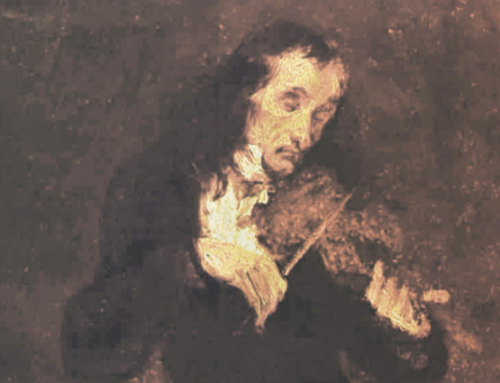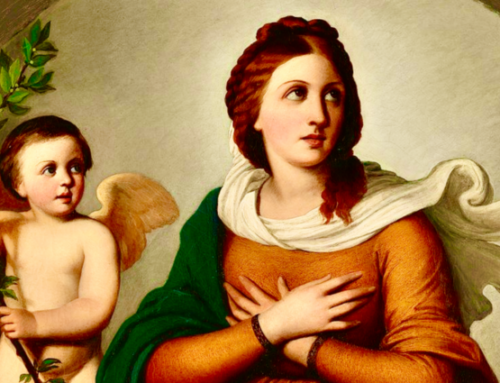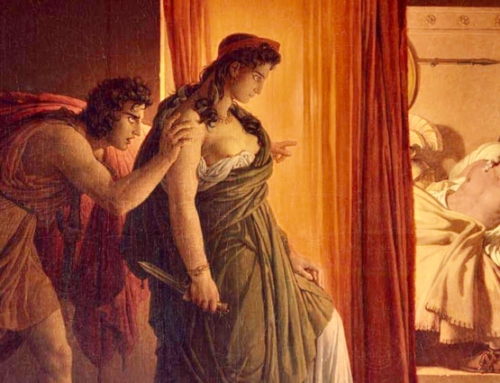Far from the common good requiring persons to enter into the kind of voluntary slavery talked about by Rousseau, it requires a recognition of certain rights and the making possible of a number of freedoms, most important of which is the right of conscience. True religious liberty is one of the main conditions for the common good being fulfilled.
 The Common Good is the subject of a good deal of sloganeering these days. The university at which I currently work uses it as an all-purpose boast and cheer. “All for the Common Good!” “Those are the words that will serve as the crux of a new branding effort to describe the University of St. Thomas,” read a news release in 2016. Lest you were confused, the release tells us, “The St. Thomas brand statement clearly defines the common good,” and quotes from said brand statement:
The Common Good is the subject of a good deal of sloganeering these days. The university at which I currently work uses it as an all-purpose boast and cheer. “All for the Common Good!” “Those are the words that will serve as the crux of a new branding effort to describe the University of St. Thomas,” read a news release in 2016. Lest you were confused, the release tells us, “The St. Thomas brand statement clearly defines the common good,” and quotes from said brand statement:
At the University of St. Thomas, we believe in hard work, human dignity and the transformative power of purple. We stand up for faith, hope and the power of individuals, working together, to achieve uncommon feats. And every day, we commit ourselves to being agents of change: to thinking critically, acting wisely and working skillfully, all for the common good.
I’m not sure what the transformative power of purple is, nor do I understand from this statement what the common good is. A little later in the year, however, another article actually did give a definition:
In the Catholic tradition, the classic definition of the common good is a set of conditions that allows each and every member of a community to flourish. This, in turn, depends on an understanding of the nature and dignity of the person, and in the Catholic view each person is an image of God with the capacity to reason, choose freely, love and live in community.
Now we’re getting somewhere: this definition relies on one that is found in the Catechism of the Catholic Church and taken from the Vatican II document Gaudium et spes: Paragraph 1906 reads, “By common good is to be understood “the sum total of social conditions which allow people, either as groups or as individuals, to reach their fulfillment more fully and more easily.” This is itself a slight variation on Pope John XXIII’s description of the common good of a political community in his 1961 encyclical letter Mater et magistra: it “embraces the sum total of those conditions of social living whereby men are enabled more fully and more readily to achieve their own perfection.”
In both cases, the common good is not a single common good (such as natural resources on public land or clean air or something else), much less a private good, one that cannot be shared. It is a set of conditions, the responsibility for which requires “the prudence of all,” the Catechism of the Catholic Church says, especially “those who exercise the office of authority.”
This note of the need for all to exercise prudence is important since many people interpret the common good as something like Rousseau’s General Will, which ultimately stays at the level of abstraction and yet involves a kind of slavery in which personal interests are canceled out and the government might be obliged to stomp out the rights of the people, who do not actually have the proper desires. The common good in Catholic understanding includes the conditions needed for persons to achieve their perfection. It is not simply the good of the “people” as a collective nor the good of the state. Nor is it, according to the Catholic Church’s Compendium of Social Doctrine, simply private goods in total. “The common good does not consist in the simple sum of the particular goods of each subject of a social entity. Belonging to everyone and to each person, it is and remains “common”, because it is indivisible and because only together is it possible to attain it, increase it and safeguard its effectiveness, with regard also to the future.” The distribution of private goods might be included in the common good, but they alone cannot make it up. An anarcho-libertarianism is not in the vision of the Catholic Church nor, I think, of any orthodox Christians, either in a Rousseauvian vein or in a more familiar form. We are inescapably social beings. The goods we share depend on and include individuals seeking out goods, but the goods are more exalted than simply private interest. “This truth,” the Compendium of Social Doctrine says, “does not simply require that [each person] live with others at various levels of social life, but that he seek unceasingly — in actual practice and not merely at the level of ideas — the good, that is, the meaning and truth, found in existing forms of social life” (165). The Catechism lists three aspects of the common good, the first of which makes this clear:
First, the common good presupposes respect for the person as such. In the name of the common good, public authorities are bound to respect the fundamental and inalienable rights of the human person. Society should permit each of its members to fulfill his vocation. In particular, the common good resides in the conditions for the exercise of the natural freedoms indispensable for the development of the human vocation, such as “the right to act according to a sound norm of conscience and to safeguard . . . privacy, and rightful freedom also in matters of religion” (1907).
Far from the common good requiring persons to enter into the kind of voluntary slavery talked about by Rousseau, it requires a recognition of certain rights and the making possible of a number of freedoms, most important of which is the right of conscience. True religious liberty is one of the main conditions for the common good being fulfilled.
This is very important. While many people think of the inalienable rights as private in nature, the Catholic Church, in a way I think very similar to the American Founders, thinks of them primarily as sacred because they allow persons to: 1) fulfill a vocation, a calling by God, which requires one to 2) have the right to act according to conscience, the voice of God echoing in the human mind as to the rightness or wrongness of particular human actions. And this is expressed ordinarily 3) in the right to worship God according to that conscience (within rational limits, of course).
The reason these conditions are front and center is because it is only in the following of the conscience that true virtue can be found, and virtue is absolutely necessary for any people. Given that the quotations in this section of the Catechism come from the Second Vatican Council, which was self-consciously attempting to deal with the modern world, it is important to note that modern forms of democratic and/or republican government require a great deal to simply function and even more to thrive. As John Adams famously observed of the American experiment, “Our Constitution was made only for a moral and religious People. It is wholly inadequate to the government of any other.”
But also among the fundamental and inalienable rights are the basic rights to the means of taking care of oneself. Pope John XXIII in his 1963 encyclical Pacem in Terris speaks of these rights:
Man has the right to live. He has the right to bodily integrity and to the means necessary for the proper development of life, particularly food, clothing, shelter, medical care, rest, and, finally, the necessary social services. In consequence, he has the right to be looked after in the event of ill health; disability stemming from his work; widowhood; old age; enforced unemployment; or whenever through no fault of his own he is deprived of the means of livelihood.
If we look in the Catholic tradition, among such rights are also the means of livelihood, namely economic initiative or work.
Of course, we have to be careful about such claims to rights, since they seem to imply duties on the parts of others. It is incumbent upon sane people to think of these usually as “negative rights,” meaning that they are primarily the right act without being prevented by others. Though in certain limit situations there may well be a “positive right” to have some of these things provided. Who has the duty to provide medical care or social services or any of the rest?
The Catechism’s second principle of the common good lays this out:
Second, the common good requires the social well-being and development of the group itself. Development is the epitome of all social duties. Certainly, it is the proper function of authority to arbitrate, in the name of the common good, between various particular interests; but it should make accessible to each what is needed to lead a truly human life: food, clothing, health, work, education and culture, suitable information, the right to establish a family, and so on (1908).
One particular modern conception lays all this on the government as the provider. Yet having a government provide all these things is a fairly dubious idea. The prudence required in the Catechism for those who hold office might take into account that the demand on public authority, even if there is a “positive right,” is not the provision of but the making “accessible” of these various goods, some of which seem to be labeled “rights” at various times.
Indeed, making government the provider of all these goods, especially education and culture, has been a modern dead-end not least because of the tendency of the modern state to gobble up the rights of parents in terms of determining what their children should learn, especially in religious and moral areas. The same would go for all the other areas. The role of the government is not to clothe and provide medical care and certainly not to provide us with culture, but to make such things accessible or, as the Compendium puts it, “available.” “The State, in fact, must guarantee the coherency, unity and organization of the civil society of which it is an expression (356), in order that the common good may be attained with the contribution of every citizen. The individual person, the family, or intermediate groups are not able to achieve their full development by themselves for living a truly human life. Hence the necessity of political institutions, the purpose of which is to make available to persons the necessary material, cultural, moral and spiritual goods” (168).
I think this “guarantee” line is important—it is the primary task of a government to guarantee unity and organization, though it cannot be the sole source of this unity or organization. The primary way in which public authority does this is by promoting and safeguarding a strong legal and juridical culture that encourages respect for the rule of law, protects rights from being violated, and, particularly, encourages and respects the rights of the various intermediary groups in society, especially those two that Pope Pius XI called “necessary societies” alongside the necessary state: the family and the Church.
The third element noted by the Catechism strikes me as more fittingly the first order of business for a government trying to protect the common good. “Finally,” we read, “the common good requires peace, that is, the stability and security of a just order. It presupposes that authority should ensure by morally acceptable means the security of society and its members. It is the basis of the right to legitimate personal and collective defense” (1909). The security of a just order is the first order of business because without it, there is no possibility of respecting or protecting rights and certainly no possibility of making any goods accessible. This just order is what I was referring to in terms of a rule of law. Alessandro Manzoni’s novel The Betrothed gives us a vision of the world of seventeenth-century Italy (not, of course, a country, but a place divided up between Spanish, French, and Austrian rule) and its lack of any just order. It is not a world without order at all, and certainly not one without laws, but the laws are neither applied nor enforced in a consistent manner:
For the forces of law gave no protection to the tranquil, inoffensive type of man, who had no other means of inspiring fear in anyone else. We do not mean that there was any lack of laws with penalties directed against private acts of violence. There was a glut of such laws in point of fact. The various crimes were listed and described and detailed in the most minute and long-winded manner. The penalties were of insane severity; and, as if that were not enough, they were almost invariably subject to augmentation at the whim of the magistrate himself, or of any one of a hundred subordinate officials.
I don’t think the ham sandwich had been invented yet, but I suspect that officials of that day could not only indict one but get magistrates to punish it extraordinarily mercilessly. The morally acceptable means of the Catechism’s language were certainly not a consideration for the keeping of order.
My own view is that this is now the situation we are in today. While in every society there is a certain degree of unfairness insofar as the connected and the wealthy will play by different rules (remember Nick Carraway’s famous lines from The Great Gatsby about how the rich are not like you and me—and in the story their destruction is definitely not creative), when a society reaches a point when the enforcement of order and justice for individuals and groups is largely dependent on one’s political alliances, the common good is fading from sight. I was reading Manzoni in 2020 when public authorities used very different approaches to crime depending on whether one was involved in a protest for BLM and Antifa or whether one was protesting the shutting down of businesses purportedly based on the risks posed by transmission of coronavirus.
This brings us to a point about the common good and Catholic Social Thought in general: the common good is not a utopian concept, an immanentization of the eschaton (as Voegelin would say), not a bringing of heaven to earth. “The goal of life in society,” as the Compendium puts it, “is in fact the historically attainable common good” (168). We should seek the good society and not the perfect society. Ensuring that competing private interests are balanced with each other and with justice is a complicated and provisional task. Final and perfect justice is simply not always possible. Some might say, of course, that it is never possible in this life. Certainly not at the level of political communities. The Compendium calls “[t]he proper reconciling of the particular goods of groups and those of individuals. . .one of the most delicate tasks of public authority.” And it notes “that in the democratic State, where decisions are usually made by the majority of representatives elected by the people, those responsible for government are required to interpret the common good of their country not only according to the guidelines of the majority but also according to the effective good of all the members of the community, including the minority” (169). The common good of a political community requires the safeguarding of the rights of all and a recognition that the losers on any particular issue are still part of the community.
What makes all this much more difficult, from the Catholic standpoint, is that the true common good, based as it is on the nature of the human person, has to take into account what it means for the human person to flourish or find fulfillment. I have been talking about the common good in the terms in which the tradition largely talks about it, namely the good of a concrete political community. “Each human community,” the Catechism of the Catholic Church says in paragraph 1910, “possesses a common good which permits it to be recognized as such; it is in the political community that its most complete realization is found. It is the role of the state to defend and promote the common good of civil society, its citizens, and intermediate bodies.” But in the next paragraph we read how “Human interdependence is increasing and gradually spreading throughout the world” (1911). This interdependence (or globalism) brings to mind or perhaps leads us in the direction of what is actually a theological truth, “the unity of the human family,” which itself “implies a universal common good.” What the Catechism then calls for is something that has been part of Catholic thinking since at least the sixteenth century and expressed directly in the Second Vatican Council’s Gaudium et spes: “an organization of the community of nations able to ‘provide for the different needs of men; this will involve the sphere of social life to which belong questions of food, hygiene, education, . . . and certain situations arising here and there, as for example . . . alleviating the miseries of refugees dispersed throughout the world, and assisting migrants and their families.’”
Now I don’t think the idea of a universal common good is itself a problem. Nor do I have a problem with calls for international cooperation. But on the other hand, the calls for an international organization are not self-evident. Political communities can make decisions together. They can make decisions along with other countries. But can we have an international organization that takes the form of a government or quasi-government that will actually be able to establish law in any legitimate fashion? Especially one that will take into account an understanding of justice that accounts for it in a fashion that anybody in the Church would accept? Papal Diplomacy and the Quest for Peace by Robert John Araujo, S.J. and John A. Lucal, S.J. is a book I read some years ago that illuminated some differences in different figures in the Catholic tradition. Benedict XV, who attempted to stop the First World War, was hot-to-trot for the League of Nations while his successor, Pius XI, was skeptical about it. Note that Pius’s three necessary societies, mentioned earlier, did not include the world. Later twentieth-century figures expressed their own skepticism about our current leading international organization: in his Nobel Prize speech, Soviet dissident Aleksandr Solzhenitsyn observed, “It is not a United Nations Organization but a United Governments Organization, where governments freely elected are equated with regimes imposed by force or with those that have gained control by an armed seizure of power.”
Nevertheless, even in the work of so reasonable a thinker as Benedict XVI, there have been calls for world government, most strongly in his 2005 encyclical Caritas in veritate:
In the face of the unrelenting growth of global interdependence, there is a strongly felt need, even in the midst of a global recession, for a reform of the United Nations Organization, and likewise of economic institutions and international finance, so that the concept of the family of nations can acquire real teeth. One also senses the urgent need to find innovative ways of implementing the principle of the responsibility to protect [146] and of giving poorer nations an effective voice in shared decision-making. This seems necessary in order to arrive at a political, juridical and economic order which can increase and give direction to international cooperation for the development of all peoples in solidarity. To manage the global economy; to revive economies hit by the crisis; to avoid any deterioration of the present crisis and the greater imbalances that would result; to bring about integral and timely disarmament, food security and peace; to guarantee the protection of the environment and to regulate migration: for all this, there is urgent need of a true world political authority, as my predecessor Blessed John XXIII indicated some years ago. (67, italics here and hereafter in original)
Let me say that if there were a category of “my pope,” Benedict XVI would be it. Nevertheless, on this line of thought, I’m firmly with Pius XI. Though there are calls for such a political authority to be subject to law and guided by solidarity and subsidiarity, I think this is fanciful.
If what we have in the UN is not very good, what exactly is the logic in giving such an organization or its successor actual power that dwarfs the power currently on offer?
Why do thinkers such as Benedict still think in this way? I think it has to do with the inability to let go of Christendom. Those thoughts about international law or the law of nations were developed when Europe was still a plausibly Christian, though fractious, entity. In that context, one could appeal to a shared understanding of the human person, at least in broad outline. But reality demands we acknowledge that the nations of the world today do not think the same way about the human person.
Which brings us to a final point. The true common good has to do with the final unity of the human race with God in heaven, a reality that the Compendium summarizes.
The common good of society is not an end in itself; it has value only in reference to attaining the ultimate ends of the person and the universal common good of the whole of creation. God is the ultimate end of his creatures and for no reason may the common good be deprived of its transcendent dimension, which moves beyond the historical dimension while at the same time fulfilling it. This perspective reaches its fullness by virtue of faith in Jesus’ Passover, which sheds clear light on the attainment of humanity’s true common good. Our history — the personal and collective effort to elevate the human condition — begins and ends in Jesus: thanks to him, by means of him and in light of him every reality, including human society, can be brought to its Supreme Good, to its fulfilment. A purely historical and materialistic vision would end up transforming the common good into a simple socio-economic well-being, without any transcendental goal, that is, without its most intimate reason for existing (170).
This perspective on the nature of the human person and our destiny tells us a lot of things that are not going to be acknowledged or acted upon by any organization the world over. Many of the concepts involved, such as solidarity and subsidiarity, are simply not recognized on a broad basis and certainly don’t have majorities. Thus, world government would likely actually retard the goal of the universal common good.
The common good is something that has to be pursued as part of a vision of the human person whose end is in Jesus. This is why the government’s role as guarantor of so much of the common good must be limited and why we must be careful about how we approach the common good. Note here that I am not making the case that some traditionalists and integralists make—that we ought to make the government the instrument of final salvation. But I am pointing to what I think is the weakness in a place like my employer’s incessant talk about doing everything for the common good without mentioning or focusing on the specifically Catholic Christian beliefs about the human person’s fulfillment. While Catholics and other Christians can certainly work for the common good with people who do not share their beliefs, their—our— work for the common good cannot be seen as completely separate from our specific theological claims or our work of evangelism.
One video on St. Thomas’s website explores the common good and, to the credit of the makers, includes the understanding that God himself is our final common good. But what is strange is that the speaker, a priest, does not mention Jesus Christ who is himself the incarnate God. Contrast this with “No Jesus, No Peace; Know Jesus, Know Peace.” So too with the common good in the final sense. While we have to settle for what is possible historically, we are always obligated to seek out the common good in the fullest possible way. Many groups these days have a vision of the common good—what should be distinctive about Catholics and all Christians is the recognition that the common good is not finally a “what” but a “Who.”
An earlier version of this essay was given as a lecture to The Tower Society, a Catholic lawyers association at the Church of the Holy Family in St. Louis Park, Minnesota.
This essay was first published here in April 2022.
The Imaginative Conservative applies the principle of appreciation to the discussion of culture and politics—we approach dialogue with magnanimity rather than with mere civility. Will you help us remain a refreshing oasis in the increasingly contentious arena of modern discourse? Please consider donating now.
The featured image is “Воскресенский мост в XVII веке” (1921) by Apollinary Vasnetsov. This work is in the public domain in Russia according to article 1281 of Book IV of the Civil Code of the Russian Federation No. 230-FZ of December 18, 2006, articles 5 and 6 of Law No. 231-FZ of the Russian Federation of December 18, 2006 (the Implementation Act for Book IV of the Civil Code of the Russian Federation), courtesy of Wikimedia Commons.







This is a great read. Thank you, Dave.
Deavel is a reliably insightful commentator. His remarks on this all too easily misunderstood “common good” are instructive.
Always enjoy your thoughtful articles!